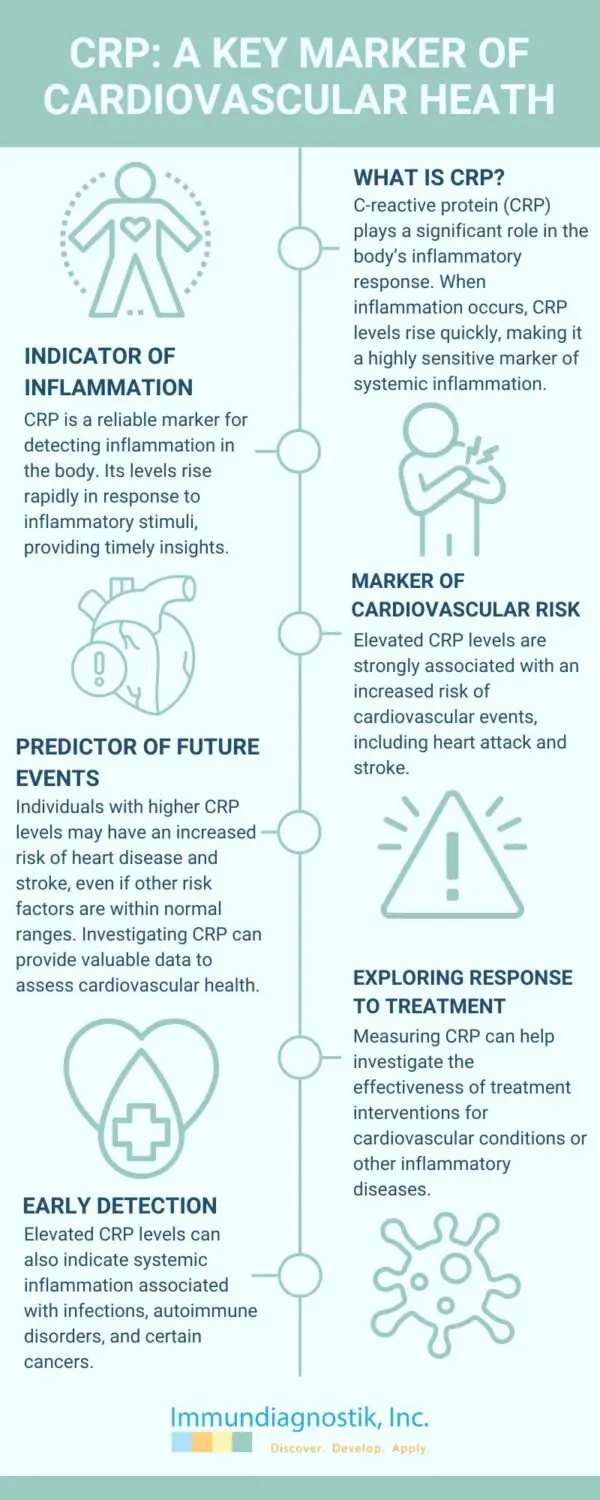Research shows that C-reactive protein (CRP) is an essential biomarker for understanding inflammation and its role in cardiovascular conditions.1 Produced by the liver in response to inflammation, CRP is one of several acute-phase reactants that increase rapidly when tissue injury or systemic inflammation occurs. For laboratories, offering CRP testing in research applications can provide critical insights into cardiovascular health and help advance studies, ultimately leading to improved clinical outcomes.
CRP is a protein that plays a significant role in the body’s inflammatory response. When inflammation occurs, CRP levels rise quickly, often within hours, making it a highly sensitive marker of systemic inflammation. Elevated CRP levels are linked to a variety of conditions, including cardiovascular disease (CVD), infections, and autoimmune disorders.
Research shows that measuring C-reactive protein can provide valuable data for more comprehensive cardiovascular studies. Here’s why it matters:
CRP is a reliable marker for detecting inflammation in the body. Its levels rise rapidly in response to inflammatory stimuli, providing timely insights into an individual’s inflammatory state. This information can be critical for assessing overall health and identifying underlying conditions.
Elevated CRP levels have been shown to be strongly associated with an increased risk of cardiovascular events, including heart attack and stroke.2 CRP is thought to contribute to the progression of atherosclerosis by exacerbating inflammation within arterial walls. Testing for CRP in research applications allows labs to provide data that supports cardiovascular risk evaluation beyond traditional markers like cholesterol and blood pressure.
CRP is not only a marker of current inflammation but also a predictor of future cardiovascular complications. Individuals with higher CRP levels may have an increased risk of heart disease and stroke, even if other risk factors are within normal ranges. This makes CRP testing a valuable tool for comprehensive cardiovascular risk assessment.
Measuring C-reactive protein can also help investigate the effectiveness of treatment interventions for cardiovascular conditions or other inflammatory diseases. A reduction in CRP levels following therapy may indicate a positive response and a lower risk of future complications.
CRP testing in research is not limited to cardiovascular health. Elevated CRP levels can also indicate systemic inflammation associated with infections, autoimmune disorders, and certain cancers.3 This broad application makes CRP an essential marker to investigate early detection and management of various conditions.

Due to its sensitivity and specificity, enzyme-linked immunosorbent assay (ELISA) is a trusted method to measure CRP levels. Implementing CRP ELISA testing in research applications ensures accurate and reproducible results to help further understand inflammation and cardiovascular health.
By incorporating CRP testing into your laboratory’s research offerings, you can provide essential data to help analyze inflammation and cardiovascular health.
Contact our team today to incorporate CRP ELISA testing into your lab’s research offering.
Together, we can advance cardiovascular health research.
The CRP ELISA is For Research Use Only in North America.
For Laboratory Professional Use Only.
No content on this site, regardless of date, should ever be used as a substitute for direct medical advice from your doctor or other qualified clinician.